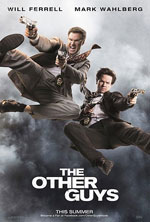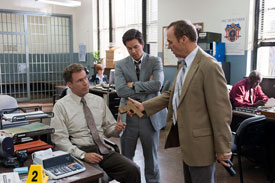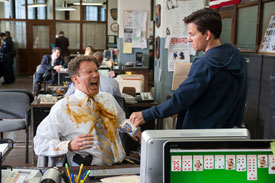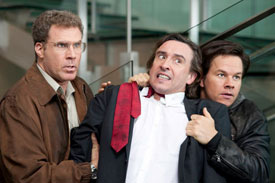
The Other Guys

 – for crude and sexual content, language, violence and some drug material.
– for crude and sexual content, language, violence and some drug material.
Director: Adam McKay
Starring: Will Ferrell, Mark Wahlberg, Michael Keaton, Steve Coogan
Running Time: 1 hour, 47 minutes
Theatrical Release Date: August 6, 2010
Official Site

Plot Summary
NYPD Detectives Christopher Danson and P.K. are the baddest and most beloved cops in New York City. They don’t get tattoos – other men get tattoos of them. Two desks over and one back, sit Detectives Allen Gamble and Terry Hoitz. You’ve seen them in the background of photos
of Danson and Highsmith, out of focus and eyes closed. They’re not heroes – they’re the Other Guys. But every cop has his or her day and soon Gamble and Hoitz stumble into a seemingly innocuous case no other detective wants to touch that could turn into New York City’s biggest crime. It’s the opportunity of their lives, but do these guys have the right stuff? (from MovieWeb.com)
Film Review
When it comes to the buddy cop movie, it’s anything but an original concept as it’s been done time and time again. Director Adam McKay, who’s responsible for movies like Anchorman and Talladega Nights, helms his own take on the genre flick, using the same style of humor as his previous films to bring a new take on the concept. Unfortunately, everything that plagued his previous films — especially language and crude humor — is what dogs his latest movie, The Other Guys.

The Other Guys takes place in New York City, and that’s about the extent of the realism McKay and Ferrell bring to the film. Mark Wahlberg stars as a detective named Terry Hoitz who’s been forced to take a desk job due to a serious mistake he made out in the field several years prior. His partner is Ferrell’s Allen Gamble, a desk cop who lives for control and enjoys playing it safe. Hoitz is bitter about his position and resents Gamble for being content with staying in the office. When the police force needs a couple of cops to step things up, Terry pushes for him and Allen to fill the void. Wahlberg and Ferrell are a great pair here, especially as Ferrell tones down his usual center-of-attention approach to his roles to serve as a glasses-wearing, number-crunching stick-in-the-mud. It’s refreshing to see Ferrell step a little bit out of his comfort zone to create a comedic character that isn’t entirely a raging egomaniac (although he manage to work in a moment or two). Allen Gamble tends to fall somewhere between Buddy The Elf and maybe Ricky Bobby. Wahlberg spends most of his time freaking out in frustration about his position, and he does well standing up to Ferrell’s schtick. It’s also great seeing Michael Keaton step out in a comedy role again, playing the department’s captain, Gene. Keaton sort of performs a bit of the Ed Harken character from Anchorman (even having a problem with his son, like Harken did), but performs it with the comedic chops that Keaton has always excelled at (his standout sequence takes place inside a Bed, Bath & Beyond). The Rock and Samuel L. Jackson make brief appearances as the ideal cops on the force (The Rock actually filled a similar position in 2008’s Get Smart) and are fun to watch in the little time on screen they’re given.
Nothing is serious (or sacred) in The Other Guys, and the film constantly reminds the viewer that nothing is being taken too seriously. Random humor is king here, too, which is the kind of brand of humor that McKay and Ferrell have subscribed to together in the past. Even when things seem like they might (or should) get serious, McKay keeps it really light, and usually lets a loudmouthed Will Ferrell step in to keep things from settling in too much. Even as Wahlberg plays Hoitz more serious or angry at times, he’ll often spout completely random (or crude) insults at his partner to keep the audience from taking him too seriously. But anyone who’s familiar with McKay’s format should know what to expect from his movies. Crude humor abounds — almost as ridiculously as last week’s Dinner For Schmucks, but with considerably more language thrown into the mix. If sexual humor isn’t being spewed forth, then it’s most likely the “s” word, and probably from Wahlberg, as over 40 uses of the word appear in this film. Among those is an assortment of other profanities, with the appearance of a sort of distorted “mother f…” in a rap song heard over a bar scene drinking montage. There’s also an implied sex scene between a man and his wife (we see them start to disrobe and kiss), and a decent amount of comedic violence (the latter of which includes several men jumping to their deaths on the street below – and we see the non-gory impacts, car chases and crashes, people being shot at and a few actually getting shot, etc).

The comedic, silly tone of The Other Guys (although grounded in a more gritty cop movie setting visually – as opposed to the more overly colorful setting of Anchorman) is the film’s strength, but also its weakness. Because it doesn’t take things too seriously, the film has no boundaries and often goes pretty far over the top. Aside from having some characters meet their demise in a surprising way that may remind some viewers of an out-of-nowhere demise/funeral sequence in Zoolander, the story also allows for Ferrell’s bookworm character Allen to have a bizarre past history… as a pimp(?!). It’s done in a silly way, but it also, in no way, really fits his character. Lastly, anyone who’s familiar with the buddy cop film genre will find the plot of the mismatched underdogs trying to solve a case that they’re not allowed to be on to be a pretty common plot. From the 1998 film Rush Hour to even the new TV show, The Good Guys, it’s a plot that we’ve seen time and time again.
The Other Guys plays out as one of those lighthearted fun feature-length romps that is hilarious at times, but ultimately takes sides with the vulgar way too often to feel truly enjoyable. I love screwball comedies, but these days, you’d be hard pressed to find one that isn’t laden with profanity and bedroom humor. While The Other Guys is a better comedy than last week’s Dinner For Schmucks, it’s just as problematic and just as frequently offensive. Your best bet is to skip them both or maybe wait for it on TV. It’s a shame, too, because if it weren’t for that, The Other Guys could have been the guys to watch.
– John DiBiase, (reviewed: 8/5/10)
Parental Guide: Content Summary
![]() Sex/Nudity: Both Danson and Highsmith make remarks about their popularity bringing them lots of sex with women; While insulting Allen with some kind of lion-eating-a-fish scenario, Terry makes a comment about “banging” the fish’s girl; When Allen’s car is stolen, we hear that the car was used for some kind of homeless people’s orgy. They then say they found a condom in the back seat; While Allen and Terry are standing by a bridge, a group of homeless people come by and say they want to use Allen’s car for an orgy. When Allen tells them they can’t, they say they’ll just do it some other time; We see Sheila in a form-fitting dress that shows lots of cleavage; Allen tells a story about how in college he was approached by a girl for some kind of money-managing with a dating service. As he describes how he looked after these girls and their money, Terry exclaims that he was a pimp. Allen down plays this, but we see flashbacks of Allen dressed in clothes that, overtime, got more elaborate and looked like something a “pimp” would wear. Later we learn that he really was a pimp; After Sheila tells Allen that she’s pregnant, he reverts back to his pimp personality and yells at her, asking who the father is and says something about his “b*tches” using protection; While mocking Allen, Terry comments that even when his pee hits a urinal it sounds feminine. When he gets in the car with Allen, he comments that the car is like riding in a vagina (or something like that); When some guys are arrested, a cop comments that the criminals have to get ready for jail and “penis;” Sheila tells Terry that she shows Allen her boobs to encourage him in his job; Sheila and Allen talk about how they met, when Allen had poison ivy in his rectum; Ershon mentions that his secret penthouse is for when his parents come to visit and prostitutes, but not at the same time; Allen goes to visit Sheila while their house is under surveillance by criminals. Sheila sends her elderly mother out to give Allen messages from her, but they get increasingly awkward and more and more explicit, to which the mother gets uncomfortable telling. As she goes back and forth giving messages to them from one another, they involve telling each other that they wish to make love and lick the sweat off each other. The last time the elderly woman goes out to see Allen, it’s actually Sheila in disguise. They passionately kiss and he tells her he knows somewhere safe they can go. We then see her removing her elderly disguise and him removing his shirt down to an under shirt. She lowers her dress on her shoulders and he starts to climb on top of her, kissing, as the scene ends (there’s no nudity, but sex is implied between the married couple); Allen’s old girlfriend comes on to him but Allen turns her down. Later, the husband wants Allen to sleep with his wife; Terry asks Allen who he lost his virginity to and Allen says it was a person who later got popular on TV (and names Heather Locklear); The Captain remarks a couple times that his son is bisexual; We hear the dialog from a video or cartoon of a pirate asking a woman to take off her panties or walk the plank, so she decides to do the former (it appears to be some kind of porn video someone is watching). We then see that Ershon is watching something on his laptop (but we never see the video). As people come into the room, he lowers the laptop so it closes, but we hear dialog that says something like “thar she blows!” and he quickly closes it so it’s turned off; Allen complains that his wife’s cooking tastes like a dog’s “a-hole;” After Allen experiences speeding for the first time, he makes a comment about being aroused by it; And probably some other innuendo or crude dialog
Sex/Nudity: Both Danson and Highsmith make remarks about their popularity bringing them lots of sex with women; While insulting Allen with some kind of lion-eating-a-fish scenario, Terry makes a comment about “banging” the fish’s girl; When Allen’s car is stolen, we hear that the car was used for some kind of homeless people’s orgy. They then say they found a condom in the back seat; While Allen and Terry are standing by a bridge, a group of homeless people come by and say they want to use Allen’s car for an orgy. When Allen tells them they can’t, they say they’ll just do it some other time; We see Sheila in a form-fitting dress that shows lots of cleavage; Allen tells a story about how in college he was approached by a girl for some kind of money-managing with a dating service. As he describes how he looked after these girls and their money, Terry exclaims that he was a pimp. Allen down plays this, but we see flashbacks of Allen dressed in clothes that, overtime, got more elaborate and looked like something a “pimp” would wear. Later we learn that he really was a pimp; After Sheila tells Allen that she’s pregnant, he reverts back to his pimp personality and yells at her, asking who the father is and says something about his “b*tches” using protection; While mocking Allen, Terry comments that even when his pee hits a urinal it sounds feminine. When he gets in the car with Allen, he comments that the car is like riding in a vagina (or something like that); When some guys are arrested, a cop comments that the criminals have to get ready for jail and “penis;” Sheila tells Terry that she shows Allen her boobs to encourage him in his job; Sheila and Allen talk about how they met, when Allen had poison ivy in his rectum; Ershon mentions that his secret penthouse is for when his parents come to visit and prostitutes, but not at the same time; Allen goes to visit Sheila while their house is under surveillance by criminals. Sheila sends her elderly mother out to give Allen messages from her, but they get increasingly awkward and more and more explicit, to which the mother gets uncomfortable telling. As she goes back and forth giving messages to them from one another, they involve telling each other that they wish to make love and lick the sweat off each other. The last time the elderly woman goes out to see Allen, it’s actually Sheila in disguise. They passionately kiss and he tells her he knows somewhere safe they can go. We then see her removing her elderly disguise and him removing his shirt down to an under shirt. She lowers her dress on her shoulders and he starts to climb on top of her, kissing, as the scene ends (there’s no nudity, but sex is implied between the married couple); Allen’s old girlfriend comes on to him but Allen turns her down. Later, the husband wants Allen to sleep with his wife; Terry asks Allen who he lost his virginity to and Allen says it was a person who later got popular on TV (and names Heather Locklear); The Captain remarks a couple times that his son is bisexual; We hear the dialog from a video or cartoon of a pirate asking a woman to take off her panties or walk the plank, so she decides to do the former (it appears to be some kind of porn video someone is watching). We then see that Ershon is watching something on his laptop (but we never see the video). As people come into the room, he lowers the laptop so it closes, but we hear dialog that says something like “thar she blows!” and he quickly closes it so it’s turned off; Allen complains that his wife’s cooking tastes like a dog’s “a-hole;” After Allen experiences speeding for the first time, he makes a comment about being aroused by it; And probably some other innuendo or crude dialog
![]() Vulgarity/Language: 1 “f” word in a song, At least 44 “s” words,” 10 “b*tch,” 1 “J*sus,” 12 “a” words, 1 “g*dd*mn,” 15 “h*ll,” 3 “a–h-le,” 3 “d*mn,” 2 “cr*p,” 3 “S.O.B,” 2 “d*ck,” about 10 derivatives of “G*d”
Vulgarity/Language: 1 “f” word in a song, At least 44 “s” words,” 10 “b*tch,” 1 “J*sus,” 12 “a” words, 1 “g*dd*mn,” 15 “h*ll,” 3 “a–h-le,” 3 “d*mn,” 2 “cr*p,” 3 “S.O.B,” 2 “d*ck,” about 10 derivatives of “G*d”
![]() Alcohol/Drugs: Allen and Terry speed up to a drug bust crime scene and accidentally hit the cocaine at the scene, covering Allen’s car in a white powder. Later, a guy wipes some off the car with his finger and rubs it on his teeth; We see a montage of images of Terry and Allen partying at a bar, getting drunk (including Allen’s stream of pee from behind him as he’s peeing on a table or something). The next day, Allen is very hung over and throws up in a garbage can; A man threatening to jump off a building is visibly drunk; In another sequence, we see Allen drinking bourbon from the bottle, then a Mike’s Hard Lemonade; there’s some talk of busting someone with marijuana
Alcohol/Drugs: Allen and Terry speed up to a drug bust crime scene and accidentally hit the cocaine at the scene, covering Allen’s car in a white powder. Later, a guy wipes some off the car with his finger and rubs it on his teeth; We see a montage of images of Terry and Allen partying at a bar, getting drunk (including Allen’s stream of pee from behind him as he’s peeing on a table or something). The next day, Allen is very hung over and throws up in a garbage can; A man threatening to jump off a building is visibly drunk; In another sequence, we see Allen drinking bourbon from the bottle, then a Mike’s Hard Lemonade; there’s some talk of busting someone with marijuana
![]() Blood/Gore: We see what looks like some blood on a sheet covering what might be a dead body at a crime scene
Blood/Gore: We see what looks like some blood on a sheet covering what might be a dead body at a crime scene
![]() Violence: We see a man jump to his death onto a hot dog vending machine; Several car chases that are very reckless and cause a lot of surrounding damage; Two guys jump off a building to what they thought might be a safe landing, but we watch them hit the pavement and die; We see lots of gun fire; A wrecking ball damages several buildings and vehicles; A man hits another man in the face with a wooden gun; A man pours hot coffee on another man; A man destroys a computer monitor out of frustration; People are held at gunpoint; Several characters are shot; A shootout breaks out in a conference room; A building explodes while two guys walk up to it; Terry and Allen rough up a man during an interrogation that goes awry (Allen ends up tearing up the place); and other comedic violence
Violence: We see a man jump to his death onto a hot dog vending machine; Several car chases that are very reckless and cause a lot of surrounding damage; Two guys jump off a building to what they thought might be a safe landing, but we watch them hit the pavement and die; We see lots of gun fire; A wrecking ball damages several buildings and vehicles; A man hits another man in the face with a wooden gun; A man pours hot coffee on another man; A man destroys a computer monitor out of frustration; People are held at gunpoint; Several characters are shot; A shootout breaks out in a conference room; A building explodes while two guys walk up to it; Terry and Allen rough up a man during an interrogation that goes awry (Allen ends up tearing up the place); and other comedic violence
